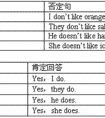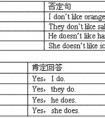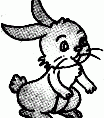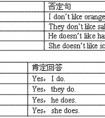根据要求写句子。1.let's, the, to,library, go (.) (连词成句) ________________________________________2. The books about games are on shelf B. (对画线部分提问-五年级英语
题文
| 根据要求写句子。 |
| 1. let's, the, to,library, go (.) (连词成句) ________________________________________ 2. The books about games are on shelf B. (对画线部分提问) ________________________________________ 3. Here's a hamburger for you. (写出答语) _________________________________________ 4. We can use our computer now. (改为一般疑问句) _________________________________________ 5. There is a CD-ROM in the book. (对画线部分提问) _________________________________________ |
答案
| 1. Let's go to the library. 2. Where are the books about games? 3. Thank you. 4. Can you use your computer now? 5. Where is the CD-ROM? |
据专家权威分析,试题“根据要求写句子。1.let's, the, to,library, go (.) (连词成句..”主要考查你对 一般疑问句,疑问副词,日常用语、谚语,连词成句 等考点的理解。关于这些考点的“档案”如下:
一般疑问句疑问副词日常用语、谚语连词成句
考点名称:一般疑问句
- 一般疑问句:
是疑问句的一种。它是以be动词,have或助动词、情态动词开头,用yes(是)或no(否)来回答的句子。
其结构是:系动词be/助动词/情态动词+主语+其他成分
一般疑问句的肯定形式为:
助动词+主语(+实义动词)。肯定答语用“yes+可定结构”。
一般疑问句的否定形式为:
助动词构成的缩写否定词+主语(+实义动词)。否定答语用“no+否定结构”。
例:
— Do you like this story-book? 你喜欢这本故事书吗?
— Yes, I do. 喜欢。/ No, I don’t. 不喜欢。
— Is he a student? 他是一名学生吗?
— Yes, he is. 是,他是。/ No, he isn’t. 不,他不是。 一般疑问句的改写:
一、含有be动词的一般疑问句,通常把be动词调到句首。例如:
陈述句:They are in the swimming pool.
一般疑问句:Are they in the swimming pool?
注意:一般疑问句句末要用“?”。
二、含有情态动词的一般疑问句(can, may...),把情态动词调到句首。例如:
陈述句:He can drive a car.
一般疑问句: Can he drive a car?
三、含有have的一般疑问句,have译为“有”。一般疑问句式有两种形式:
1.把have/has调到句首。例如:
陈述句:Tommy has a computer.
一般疑问句:Has Tommy/he a computer?
2.加助动词do/does,第三人称单数用does,其他人称用do。其句型为:Do/Does + 主语 + have...?
例如上句可变为: Does Tommy have a computer?四、一般动词的一般疑问句,也要借助助动词do/does,第三人称单数用does,其余人称用do。
其句型为:Do/Does + 主语 + 动词原形+其它?
陈述句:Amy speaks English.
一般疑问句:Does Amy speak English?一般疑问句的回答:
首先要有人称的改变。当主语为名词时,在答语中要改成其相应的代词。
另外,答语有两种,肯定的回答(用yes)和否定的回答(用no),否定式常用缩写形式。
现在还是让我们分句型一一说明。一、一般疑问句含be动词时,用be动词回答,句末用句号。例如:
-Is Mary your sister?
-Yes, she is. / No, she isn’t.(缩写)二、一般疑问句含有情态动词(can, may, should等)时,用情态动词回答。例如:
-May I come in?
-Yes, you may. / No, you can’t.三、一般疑问句含有have(译为“有”)时,有两种回答方式。
1.直接用have/has回答。
例如:
-Have they any pictures?
-Yes, they have. / No, they haven’t.
2.用助动词do/does回答。
例如:
-Does Millie smoke?
-Yes, she does. / No, she doesn’t.四、一般动词的一般疑问句回答时也用助动词。
例如:
-Do the workers live in London?
-Yes, they do. / No, they don’t.
考点名称:疑问副词
- 疑问副词:
用来引导特殊疑问句,表示时间,地点,方式,原因等,常见的有:when,where,how,why等。
分类:
时间副词:now, then, yesterday, always, already, soon
地点副词:here, home, upstairs, nowhere, above, near, beyond
方式副词:多数是形容词加上ly构成的,和一些well, fast, quick, slow, hard, alone, straight, wide
在加词尾ly时要注意:
(1)辅音+le:simple→simply, gentle→gently,
(2)以ic结尾的词:classic→classical但是public→publicly
(3)以辅音读音是[i]的y结尾的词:easy→easily
(4)特例:full→fully, whole→wholly, true→truly
程度副词,连接副词,关系副词
much, enough, quite, hardly, almost, deeply
疑问副词连接副词,关系副词:
how,who,where - 疑问副词在句中的位置及用法举例:
由于疑问副词后接疑问句,因此这些副词一般都位于句首。例如:
How do you go to school? 你怎么去上学?
Why do you dislike the game? 为什么你不喜欢这个游戏? - 疑问代词和疑问副词区别:
1. 疑问代词做对陈述句的主语,宾语或定语提问,即做句子的主语,宾语或定语, 如:
what, who/ whom, whose.
eg. Who is talking ?
What can you see?
Whose shirt is this?
2.疑问副词对时间,地点,方式等状语提问,如:
when, where, how 等.
eg. When is your birthday?
Where are you going?
How do you know?
考点名称:日常用语、谚语
- 日常用语:
日常生活中经常用到的一些句子。例如:
Good morning. / Good afternoon. / Good evening.
Goodbye. / Bye-bye./ See you later.
How are you? I’m fine, thanks.
I see.我明白了。
Shut up! 闭嘴!
Good job! 做得好!
Have fun! 玩得开心!
This way. 这边请。
Follow me. 跟我来。
Of course! 当然了!/ Sure. 当然可以。
What's up? 有什么事吗?
Be careful! 注意! 英语常用语和谚语举例:
常用谚语:
1.A bad beginning makes a bad ending. 不善始者不善终。
2.A bad thing never dies. 遗臭万年。
3.A bad workman always blames his tools.不会撑船怪河弯。
4.A bird in the hand is worth than two in the bush.一鸟在手胜过双鸟在林。
5.A boaster and a liar are cousins-german.吹牛与说谎本是同宗。
6.A bully is always a coward. 色厉内荏。
7.A burden of one's choice is not felt. 爱挑的担子不嫌重。
8.A candle lights others and consumes itself. 蜡烛照亮别人,却毁灭了自己。
9.A cat has 9 lives. 猫有九条命。
10.A cat may look at a king. 人人平等。
11.A close mouth catches no flies. 病从口入。
12.A constant guest is never welcome. 常客令人厌。
13.Actions speak louder than words. 事实胜于雄辩。
14.Adversity leads to prosperity. 穷则思变。
15.Adversity makes a man wise, not rich. 逆境出人才。
- 最新内容
- 相关内容
- 网友推荐
- 图文推荐
| [家长教育] 孩子为什么会和父母感情疏离? (2019-07-14) |
| [教师分享] 给远方姐姐的一封信 (2018-11-07) |
| [教师分享] 伸缩门 (2018-11-07) |
| [教师分享] 回家乡 (2018-11-07) |
| [教师分享] 是风味也是人间 (2018-11-07) |
| [教师分享] 一句格言的启示 (2018-11-07) |
| [教师分享] 无规矩不成方圆 (2018-11-07) |
| [教师分享] 第十届全国教育名家论坛有感(二) (2018-11-07) |
| [教师分享] 贪玩的小狗 (2018-11-07) |
| [教师分享] 未命名文章 (2018-11-07) |





![____ it got four wheels?[ ]A. Have B. There C. Has-五年级英语](http://www.00-edu.com/d/file/ks/4/1/65/2019-08-31/small2ca0aeba76320ba6f81e40fe83a0e8111567199443.png)
